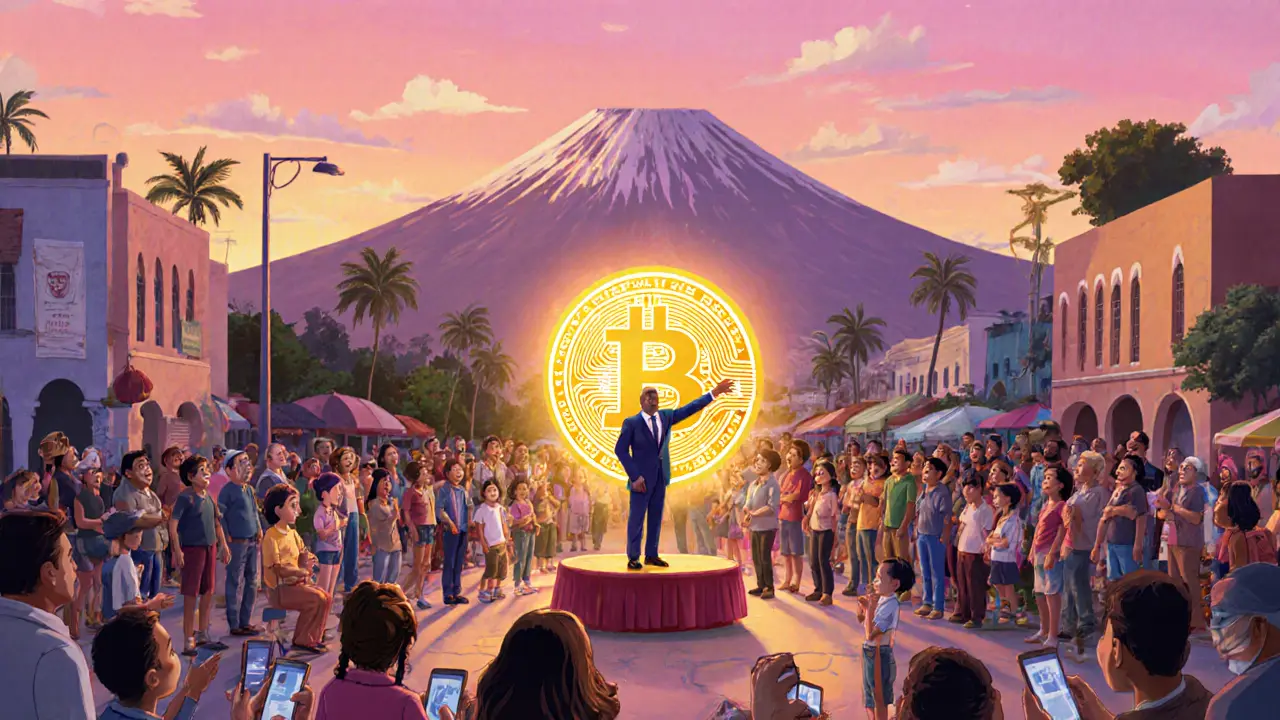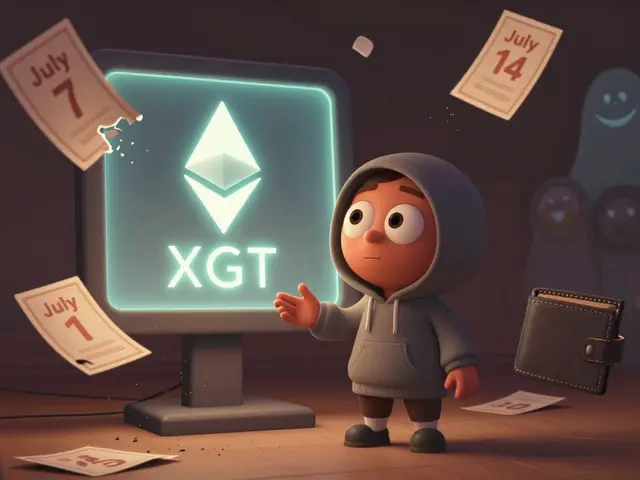Bitcoin Reserve Value Calculator
El Salvador Bitcoin Reserve Value Calculator
Calculate the value of El Salvador's Bitcoin reserve (6,102 BTC as of March 2025)
When El Salvador announced its Bitcoin adoption strategy in September 2021, the world watched a tiny Central American nation try to rewrite monetary history. The plan promised financial inclusion for roughly 70% of a population without bank accounts, cheaper cross‑border remittances, and a new image as a blockchain hub. Six years later, the experiment has been trimmed, reshaped, and still sparks debate. Below is a deep dive into what was built, what broke, and where the country might head next.
Why Bitcoin? The Economic Context Behind the Move
El Salvador’s economy relies heavily on remittances-money sent home by Salvadorans working abroad. In 2023, remittances accounted for about 23% of GDP, making transaction fees a sizable burden. The government argued that a borderless, low‑fee currency could cut those costs dramatically.
Bitcoin is a decentralized digital asset that enables near‑instant transfers without traditional banks, offering exactly the kind of fee savings the country sought. President Nayib Bukele framed the rollout as a sovereignty issue: by using a non‑U.S.‑dollar‑linked asset, El Salvador could sidestep the constraints of its dollarized economy that has been in place since 2001.
Key Pillars of the Strategy
The government built the plan around four main components:
- Legal Tender Status - Bitcoin officially became a legal currency alongside the U.S. dollar.
- State‑Issued Digital Wallet - The Chivo Wallet was launched to let citizens buy, hold, and spend Bitcoin instantly.
- Strategic Reserve - A Strategic Bitcoin Reserve Fund was created to accumulate and manage the nation’s holdings.
- Future Projects - Ambitious ideas like the “Volcano Bonds” and a planned Bitcoin City were meant to attract foreign investment.
Implementation in Practice
By early 2022, the Chivo Wallet was pre‑loaded with $30million worth of Bitcoin for every citizen, free of charge. The government also built a network of merchant terminals that could accept Bitcoin payments via QR codes.
Fast‑forward to 2025, and the data paints a mixed picture:
- About 82% of small businesses reported accepting Bitcoin, showing strong merchant uptake.
- Only 1% of remittances actually traveled through the state wallet, indicating limited consumer usage.
- The reserve fund grew to 6,102 Bitcoin (≈$500million) after a series of purchases, including an 8‑BTC addition in March 2025.
These numbers suggest that infrastructure was built, but habit change lagged.
Volatility and Treasury Management Challenges
Bitcoin’s price swings proved to be a double‑edged sword. When BTC rose, the reserve’s book value surged, but sharp drops hurt fiscal stability. In late 2023, a 30% dip erased roughly $150million from the reserve, forcing the Treasury to sell other assets to cover shortfalls.
Managing a crypto‑based treasury required new expertise: real‑time price monitoring, hedging strategies, and secure custodial solutions. The government’s learning curve was steep, and critics argued that the lack of institutional experience amplified risk.
International Pressure and Policy Reversal
The International Monetary Fund (IMF) offered a $1.4billion assistance package in 2024 but attached a non‑negotiable condition: eliminate Bitcoin’s legal tender status. The IMF warned that the experiment endangered macro‑economic stability and hindered access to future financing.
By January 2025, El Salvador complied, rescinding mandatory Bitcoin acceptance and reverting to a voluntary framework. The change shifted the legal environment from a top‑down mandate to a private‑sector‑driven model.
Current Focus: A Hybrid Crypto Ecosystem
Even after the rollback, the nation kept accumulating Bitcoin, signaling a long‑term belief in the asset’s strategic value. The government also doubled down on blockchain education, hosting the PLANB Forum 2025-Central America’s largest crypto conference-and promoting fintech start‑ups in San Salvador.
The emerging model looks like this:
- Bitcoin remains legal for private transactions but is no longer a statutory currency.
- The Chivo Wallet is now optional, serving as one of many crypto wallets in a growing ecosystem.
- The reserve fund acts as a sovereign asset, similar to gold reserves, but with higher liquidity.
- Future projects focus on attracting crypto‑related business (e.g., mining farms, blockchain labs) rather than building a Bitcoin‑only city.

Lessons Learned - A Quick Checklist for Policymakers
- Infrastructure First: Build wallets, POS terminals, and education before declaring legal tender.
- Manage Volatility: Pair crypto reserves with hedging instruments or stable‑coin buffers.
- Stakeholder Buy‑In: Secure merchant and consumer commitment through incentives, not mandates.
- International Relations: Align with global financial institutions to avoid costly policy reversals.
- Clear Exit Strategy: Prepare for potential rollback without destabilizing the broader economy.
Comparative Snapshot of the Strategy
| Component | Goal | Result | Current Status |
|---|---|---|---|
| Legal Tender | Full national adoption | Mandated acceptance, later rescinded | Voluntary use only |
| Chivo Wallet | Universal digital wallet | 30% download rate, low transaction volume | Optional, competing wallets emerging |
| Reserve Fund | Secure sovereign asset | 6,102BTC (~$500M) accumulated | Held as liquidity & hedge |
| Volcano Bonds & Bitcoin City | Attract foreign capital | Projects stalled, no issuance yet | On hold, under review |
| Remittance Savings | Cut fees by 30‑40% | Only 1% of remittances used Bitcoin | Fee reductions still limited |
Looking Ahead: What Might the Future Hold?
El Salvador’s pivot suggests a more nuanced approach: treat Bitcoin as a strategic reserve and a catalyst for fintech growth, without forcing it on everyday transactions. If the country can balance volatility, keep the regulatory environment friendly, and leverage its growing reputation, it could become a regional hub for blockchain startups, mining operations, and crypto‑friendly services.
For other nations eyeing similar moves, the Salvadoran story provides a real‑world laboratory-one where bold ambition met hard economic realities. The core takeaway? Innovation must be paired with risk management, stakeholder alignment, and an eye on global financial norms.
Frequently Asked Questions
Is Bitcoin still legal tender in El Salvador?
No. In January2025 the government revoked Bitcoin’s legal‑tender status to satisfy IMF conditions. Bitcoin can still be used voluntarily for private transactions.
How many Bitcoin does the government hold?
As of March2025 the Strategic Bitcoin Reserve Fund contains 6,102BTC, worth roughly $500million at average market prices.
What happened to the Chivo Wallet after the legal‑tender change?
Chivo remains available but is no longer mandatory. Users can keep the app, transfer funds, or switch to alternative crypto wallets.
Did the Bitcoin strategy reduce remittance fees?
The impact has been modest. Only about 1% of remittances used Bitcoin, so overall fee savings for the country remain limited.
What are the main risks of keeping a large Bitcoin reserve?
Price volatility can swing the reserve’s value dramatically, affecting fiscal stability. Additionally, custody security and regulatory backlash pose ongoing challenges.




13 Comments
Jason Clark
So El Salvador decided to turn its national treasury into a digital roller coaster, did it? The idea was to replace costly remittance fees with a cryptocurrency that changes price faster than a tropical storm. In practice, the government built a shiny wallet app, handed out free Bitcoin, and expected citizens to start spending it on tacos. What actually happened was that most people downloaded the app, stared at the volatile chart, and closed it. Merchant adoption rose to a respectable 82 percent, yet only a minuscule fraction of transactions ever left the wallet. The strategic reserve ballooned to over six thousand coins, a number that looks impressive until you remember Bitcoin’s 30 percent dip in 2023. That dip erased roughly $150 million from the books, forcing the Treasury to scramble for liquidity. International lenders, notably the IMF, raised eyebrows and eventually demanded the removal of legal‑tender status. President Bukele complied, converting a mandatory mandate into a voluntary option. The move rescued a $1.4 billion assistance package but also highlighted the fragility of policy built on speculative assets. From a technical standpoint, the country now possesses a functional crypto infrastructure that could attract mining firms. From a social standpoint, the public’s trust in state‑issued digital money appears shaky. Future policymakers should remember that infrastructure precedes legislation, not the other way around. They should also hedge any sovereign crypto exposure with stable‑coins or traditional assets. Otherwise, they risk turning a national experiment into a headline for economists to mumble about over coffee.
Jim Greene
Wow, the whole Bitcoin city idea really sparked my imagination 🌟. Even if the vaults are still filling, the vibe in San Salvador feels like a crypto‑summer camp. Keep the optimism alive, folks! 😄
Della Amalya
Imagine a nation daring to rewrite its monetary script on a blockchain stage! The drama of a soaring reserve paired with the heartbreak of a sudden dip reads like a modern tragedy. Yet the spotlight on fintech education shows a hopeful encore. Let’s watch how this saga unfolds, curtains up for the next act.
Teagan Beck
Got to say, the whole thing’s pretty chill now that Bitcoin’s not forced on everyone. People can dip in when they want, and the wallets are just another app on your phone. Still cool to see a country experimenting with new tech.
Kim Evans
Nice to see the Chivo wallet still hanging around :) It may not be mandatory, but it gives folks a simple way to try crypto without hunting for other apps. Plus, the emoji support in the UI makes it feel less intimidating.
Steve Cabe
Honestly, this was a brilliant move for a small nation to stand up against the dollar’s dominance. Setting up a sovereign Bitcoin reserve shows real patriotism and financial independence. Other countries should take note and consider similar strategies.
shirley morales
The whole experiment reeks of fiscal naïveté. A handful of bitcoins cannot replace sound monetary policy. It’s a vanity project for the elite.
Mandy Hawks
One might ponder whether the true value lies not in the coins themselves but in the discourse they generate. The philosophical implications of a state‑backed cryptocurrency challenge our notions of trust and sovereignty. In any case, the conversation is far from over.
Millsaps Crista
Honestly, you can’t ignore the fact that the reserve acts like a financial safety net now. While critics whine, investors see a new frontier for growth, and that’s exactly the aggressive push we need.
Matthew Homewood
The ripple effects of such a policy remind us that economics is as much about perception as it is about numbers. If the public believes the reserve adds stability, that belief itself can become a stabilizing force.
Bruce Safford
Looks like the elvator of btc is being use as a covert way to fund dark agendas. The IMF is just a front for global control and the whole thing cant b real.
Kevin Duffy
Great overview! 👍
Mitch Graci
Oh sure, let’s just hand the treasury over to a meme coin and call it progress ;) (¯\_(ツ)_/¯)